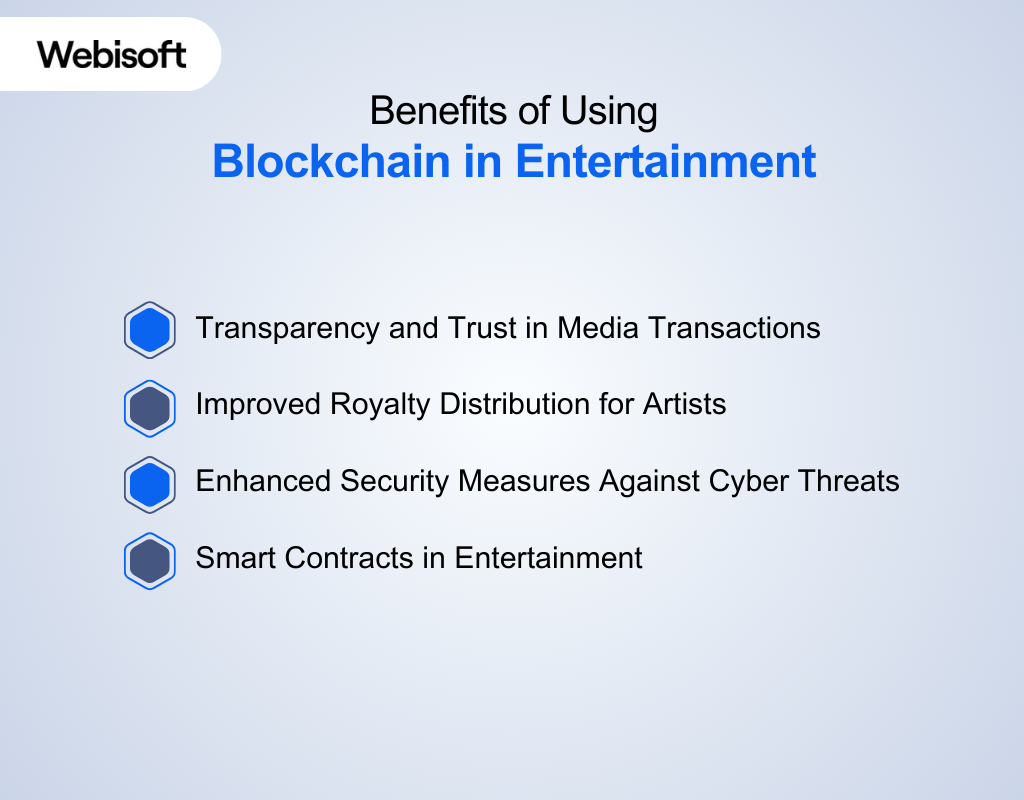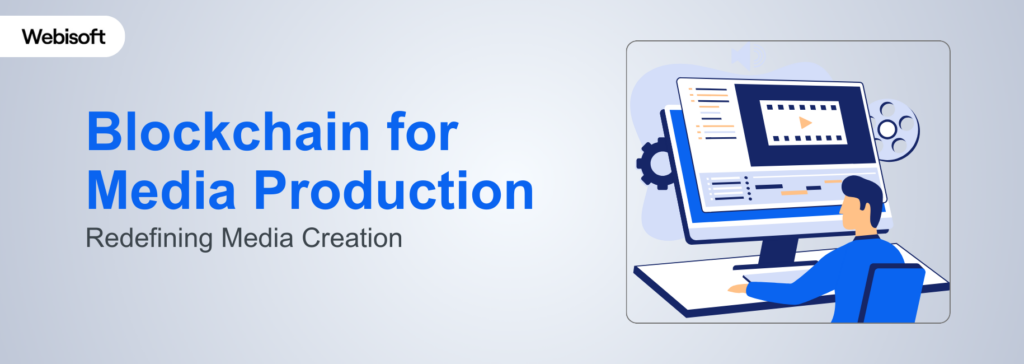Did you know that every day, millions of dollars are lost to piracy in the media production industry? What if there was a technology that could revolutionize how content is created, distributed, and protected, all while developing direct connections between creators and consumers? This is where blockchain comes in.
So, thinking about the other benefits of Blockchain for media production
The benefits of blockchain in media production are remarkable. It brings an exceptional level of transparency and traceability to financial transactions, protects against piracy, and promotes direct connections between content creators and consumers.
In this article, we’ll understand the dynamic potential of blockchain for media production. We’ll explore its benefits, challenges, global impacts, and how blockchain can lead to market growth in advertising and media. Let’s get started!
Contents
- 1 What is Blockchain for Media Production?
- 2 Blockchain’s Impact on Various Entertainment Sectors
- 3 Benefits of Using Blockchain in Media Industry
- 4 Challenges and Limitations of Blockchain in Entertainment
- 5 Real-life Use Cases of Blockchain in Media Production
- 6 Why Should You Choose Webisoft in Implementing Blockchain for Media Production?
- 7 Conclusion
- 8 FAQs
What is Blockchain for Media Production?
Blockchain for media production is the integration of blockchain technology into various aspects of creating, distributing, and monetizing media content, such as films, music, and videos.
It uses blockchain’s decentralized and transparent nature to make financial transactions more transparent, safeguard intellectual property rights, prevent piracy, and enable creators to interact directly with their audience.
This integration has the potential to reshape the media production industry, by offering increased security, fair pay for creators, and better tracking of transactions.
Blockchain’s Impact on Various Entertainment Sectors

Blockchain technology is making a significant impact across various sectors of the entertainment industry. Here are some key areas where blockchain is bringing about transformative changes:
Blockchain in Television Broadcasting
Blockchain is revolutionizing television broadcasting by enabling more personalized content delivery. This means viewers can access content that aligns with their preferences, while broadcasters gain insights from data-driven analytics.
The Role of Blockchain in Film Distribution
Blockchain film industry offers a transparent and efficient way to manage rights, royalties, and distribution agreements. This ensures that everyone involved in film production receives fair compensation.
Revolutionizing Music Streaming
Blockchain is disrupting the music industry by allowing artists to distribute their music directly to fans, bypassing the need for traditional record labels and intermediaries. This leads to a more equitable distribution of revenue.
Enhancing Gaming and eSports
The gaming and eSports sectors are experiencing a blockchain-driven transformation. Blockchain technology introduces secure ownership of in-game assets, transparent tournament systems, and decentralized gaming platforms. Gamers now have true ownership of virtual assets and can participate in fair competitions.
Benefits of Using Blockchain in Media Industry

The entertainment industry is experiencing a significant transformation, and the integration of blockchain technology stands out as a guiding light of innovation.
Blockchain is important in media production for the following reasons:
Enhanced Copyright Protection
Blockchain creates a secure record of who owns the content and when it was made. This proof helps content creators protect their work from being used without permission, piracy, or disputes over who owns it.
Transparent Royalty Payments
Blockchain uses smart contracts to automate royalty payments based on predefined terms. This ensures content creators receive fair compensation without delays or disputes.
Reduced Piracy
Blockchain’s strong security makes it very hard for unauthorized parties to tamper with or distribute content without proper permission. This reduces the risk of piracy and keeps content secure.
Direct Creator-Consumer Relationships
Blockchain enables direct, peer-to-peer transactions between content creators and consumers, eliminating the need for intermediaries. This direct interaction creates more stronger and personal connections between creators and consumers while also ensuring that creators retain a larger portion of their earnings.
Global Collaboration
Blockchain’s decentralized system breaks down geographical barriers, enabling creators from around the world to work together easily. This global collaboration promotes diversity and sparks innovative content creation.
Innovative Monetization
Blockchain introduces creative monetization methods, including microtransactions and tokenization. This way users can make small, often cryptocurrency-based payments for content on a per-use basis, providing content creators with additional revenue streams.
Content Authentication
Blockchain is a powerful tool for verifying content authenticity. When content is stored on the blockchain, it cannot be altered or tampered with, this gives consumers confidence that the content they access is genuine and unchanged.
Enhanced Transparency
All blockchain transactions are transparent and traceable. This builds trust among everyone involved in content creation and distribution, reducing disputes and improving collaboration.
Challenges and Limitations of Blockchain in Entertainment

While blockchain technology offers exciting possibilities, it also brings challenges and limitations that the entertainment industry must confront:
Scalability Issues in Blockchain Implementation
One of the main challenges is the ability of blockchain networks to handle a large number of transactions, especially as the entertainment industry continues to expand rapidly. It’s important to find flexible solutions to meet the increasing demands.
Regulatory Challenges and Compliance
Blockchain’s decentralized nature can sometimes clash with existing legal frameworks and industry regulations. It’s crucial to effectively address these regulatory issues and ensure compliance
Technical Difficulties
Implementing blockchain media production requires overcoming technical challenges. This includes seamlessly integrating blockchain into current systems and creating user-friendly interfaces.
Real-life Use Cases of Blockchain in Media Production
Blockchain technology has found real-life use cases in media production, transforming various aspects of the industry. Some of them are:
SingularDTV
SingularDTV uses blockchain to empower artists and content creators. It offers tools to manage intellectual property rights, royalties, and distribution in a transparent and decentralized manner. Creators can track their content’s usage and receive fair compensation automatically through smart contracts.
Audius
Audius is a blockchain-based music streaming platform that connects artists directly with their fans. It eliminates intermediaries and enables artists to upload and monetize their music without relying on traditional record labels.
Verasity
Verasity uses blockchain to combat ad fraud and provide fair compensation to content creators. Through its Proof of View technology, it ensures that video views are genuine, preventing ad fraud and ensuring that creators receive accurate revenue.
TaTaTu
TaTaTu is a blockchain-powered entertainment platform that rewards users with tokens for engaging with content. Users can earn tokens by watching videos, and content creators are compensated based on user engagement.
Flixxo
Flixxo is a decentralized video sharing platform that combines blockchain and peer-to-peer technology. Content creators are rewarded with Flixx tokens based on the popularity of their content, and viewers can earn tokens by watching and sharing videos.
KodakOne
KodakOne utilizes blockchain to protect image copyrights and license images. Photographers can register their work on the blockchain, and the platform helps track unauthorized use and enforce copyrights.
Livepeer
Livepeer uses blockchain to decentralize video streaming infrastructure. It allows content creators to broadcast live video at a fraction of the cost compared to traditional platforms.
Auditchain
Auditchain offers blockchain-based financial reporting and audit solutions for media companies. It enhances transparency and accountability in financial transactions and reporting.
Brave Browser
Although it is primarily a web browser. But Brave incorporates blockchain to enable users to tip content creators with Basic Attention Tokens (BAT) for their content, including articles, videos, and websites.
Why Should You Choose Webisoft in Implementing Blockchain for Media Production?

Webisoft is a top-tier blockchain solutions provider. Let’s explore why Webisoft is the best option for getting blockchain development services:
Expertise and Knowledge
At Webisoft, our Solana consulting team consists of experienced blockchain experts with in-depth knowledge of blockchain technology, including expertise in blockchain node operations critical for media production systems. Whether you need solutions for media production or Enterprise Blockchain solutions, we understand the complexities of blockchain and how it can be optimally applied to your business needs.
Customized Solutions
We excel in creating customized blockchain solutions. We take time to understand your unique requirements and ensure that our blockchain implementation aligns seamlessly with your specific business objectives.
Proven Success
Webisoft brags a track record of successfully implementing blockchain solutions across various industries, including media. Our consistent success shows that we can turn blockchain ideas into real, useful solutions.
Continuous Support
We offer continuous support and maintenance for your blockchain solutions. Our team is here to assist you whenever you need it, ensuring that your blockchain systems run smoothly and efficiently.
Conclusion
That’s all about it. You surely have gotten a good understanding of blockchain for media production throughout our detailed discussion. We’ve covered everything from its impacts, benefits, challenges and we also learned about some of its real-life use cases.
The integration of Blockchain for media and entertainment marks a significant step towards improved transparency, security, and efficiency. It has the potential to reshape conventional practices, offering content creators, distributors, and consumers a more secure and direct ecosystem.
At Webisoft, we are experienced professionals in blockchain technology. Contact us today and transform your content production with blockchain technology.
FAQs
Can blockchain technology be applied to live events in the entertainment industry?
Yes, blockchain technology can be applied to live events in the entertainment industry. It can improve ticketing systems, security, and enable transparent revenue sharing.
How does blockchain address environmental concerns related to energy consumption in the media industry?
Blockchain addresses environmental concerns by utilizing energy-efficient consensus mechanisms like Proof of Stake (PoS) and Proof of Authority (PoA), reducing energy consumption compared to energy-intensive Proof of Work (PoW) used in cryptocurrencies like Bitcoin.
How can blockchain lead to market growth in advertising and media?
Blockchain opens new opportunities for targeted advertising, innovative content delivery, and collaborative initiatives, driving sustained market growth.
